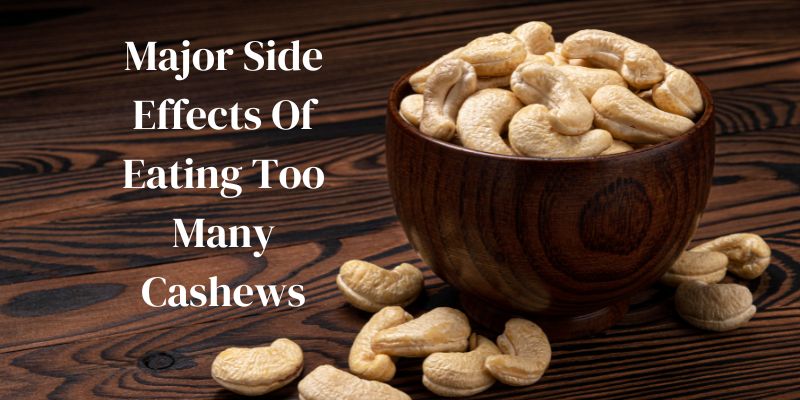Cashews are delicious and nutritious nuts that are widely consumed around the world. They are packed with essential nutrients like healthy fats, proteins, vitamins, and minerals. While cashews offer numerous health benefits when consumed in moderation, excessive intake can lead to certain side effects. In this article, we will discuss into the major side effects of eating too many cashews and highlight the hazards of overindulgence.
10 Major Side Effects Of Eating Too Many Cashews
1. Weight Gain
Cashews are energy-dense nuts, meaning they contain a significant amount of calories. Consuming excessive quantities of cashews can contribute to weight gain, especially when not balanced with an active lifestyle or a well-regulated diet. It is crucial to be mindful of portion sizes to avoid an excessive calorie intake.
2. Digestive Issues
Overconsumption of cashews can lead to digestive problems such as bloating, gas, and abdominal discomfort. Cashews contain a high amount of dietary fiber, and consuming them in excess can overwhelm the digestive system, causing these uncomfortable symptoms. Individuals with pre-existing digestive conditions, such as irritable bowel syndrome (IBS), may be more susceptible to these side effects.
3. Allergic Reactions
Although rare, some people may experience allergic reactions to cashews. Cashew allergies are similar to other tree nut allergies and can range from mild symptoms like itching and hives to more severe reactions such as difficulty breathing and anaphylaxis. It is essential to be aware of any existing allergies or sensitivities before consuming cashews excessively.
4. Nutrient Imbalances
Cashews are a good source of various essential nutrients. However, consuming an excessive amount of cashews may result in nutrient imbalances, particularly if they replace other vital food groups in the diet. Overindulgence in cashews may lead to an inadequate intake of other nutrients necessary for optimal health. Maintaining a balanced diet is crucial to avoid such imbalances.
5. Oxalate-Related Issues
Cashews, like many other nuts and seeds, contain oxalates, which are naturally occurring compounds. In excessive amounts, oxalates can contribute to the formation of kidney stones in susceptible individuals. Those with a history of kidney stones or certain medical conditions, such as hyperoxaluria, should exercise caution when consuming large quantities of cashews.
6. Unwanted Weight Loss
While weight gain was mentioned as a side effect of excessive cashew consumption earlier, it’s important to note that some individuals may experience unintended weight loss due to excessive intake. Cashews have a high caloric content, and consuming them in large quantities may lead to an imbalanced diet, causing unintentional weight loss in some cases.
7. Elevated Blood Pressure
Cashews are naturally low in sodium, which makes them a healthier alternative to other salty snacks. However, consuming excessive amounts of cashews can still contribute to elevated blood pressure levels due to their high potassium content. Potassium, when consumed in excess, can counteract the effects of sodium and potentially increase blood pressure in susceptible individuals. It is crucial to maintain a balanced intake of potassium and sodium for optimal cardiovascular health.
8. Increased Risk of Nutrient Toxicity
While cashews offer a wide range of essential nutrients, excessive consumption can lead to nutrient toxicity. For instance, cashews contain a significant amount of copper, which is necessary for various bodily functions. However, consuming excessive amounts of cashews on a regular basis can lead to copper toxicity, resulting in symptoms such as nausea, vomiting, and liver damage. It is important to consume cashews as part of a well-balanced diet to avoid nutrient imbalances.
9. Adverse Effects on Blood Sugar Levels
Cashews have a moderate glycemic index, which means they can cause a gradual increase in blood sugar levels. While this can be beneficial for maintaining stable blood sugar levels when consumed in moderation, excessive intake of cashews can lead to spikes in blood sugar levels. Individuals with diabetes or insulin resistance should be cautious when consuming large quantities of cashews to prevent adverse effects on blood sugar control.
10. Potential Aflatoxin Contamination
Aflatoxins are toxic substances produced by certain molds that can contaminate nuts, including cashews. These molds thrive in warm and humid conditions. Although strict quality control measures are in place, there is still a slight risk of aflatoxin contamination in cashews. Consuming large amounts of cashews contaminated with aflatoxins can have detrimental effects on liver health and increase the risk of liver cancer. To minimize this risk, it is advisable to purchase cashews from reputable sources and store them in cool, dry environments.
You may also like:
Major Side Effects Of Eating Too Many Pistachio
Effective Weight Loss Strategies
How Long Does it Take for Chamomile Tea to Work?
Conclusion
Cashews are undoubtedly a healthy and tasty snack when enjoyed in moderation. However, consuming too many cashews can lead to various side effects that may impact your overall well-being. It is essential to practice portion control, maintain a balanced diet, and be aware of any allergies or sensitivities you may have. By doing so, you can enjoy the nutritional benefits of cashews without falling victim to the hazards of overindulgence.
